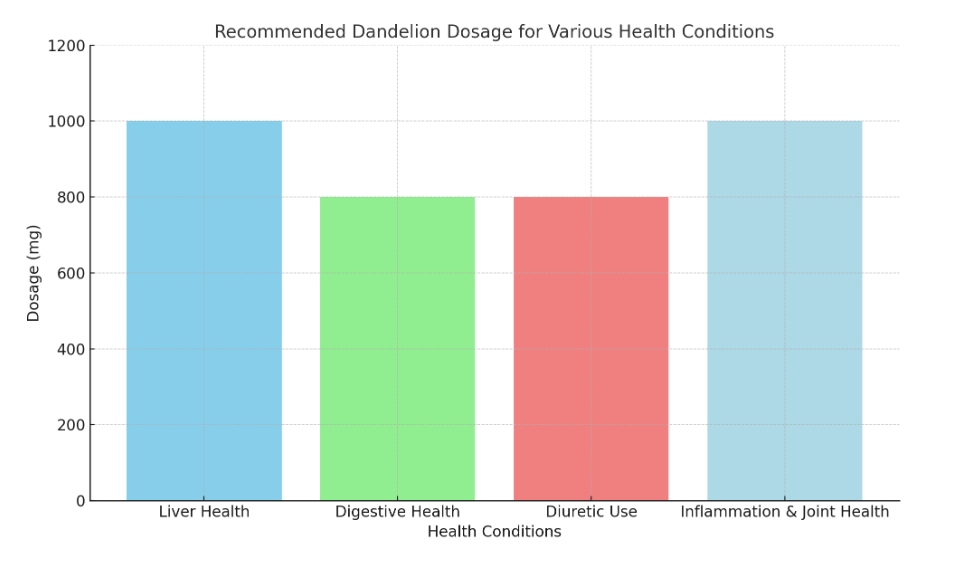
Dandelion (Taraxacum Officinale) is a perennial herbaceous plant that belongs to the Asteraceae family. Often recognized by its bright yellow flowers and jagged, deeply lobed leaves, dandelion is commonly found in temperate regions around the world, thriving in gardens, lawns, and fields. While often dismissed as a common weed, dandelion is actually a versatile herb with a long history of culinary and medicinal uses.
Dandelion is exceptionally rich in nutrients, making it a valuable addition to any diet. All parts of the plant, the leaves, flowers, and roots are edible and can be incorporated into various culinary applications. The leaves can be used fresh in salads or cooked like spinach, while the flowers can be used to make dandelion wine or added to salads.
Nutritiously, dandelions are good sources of the vitamins A, C and K as well as essential minerals like potassium, calcium and iron. [1] The root is known for its health benefits including its role in supporting liver health and digestion.
In traditional medicine, dandelion has been used for its diuretic properties, promoting increased urine production and helping to eliminate excess fluids from the body. [2] This can be beneficial for individuals looking to manage weight or reduce water retention. Additionally, dandelion is believed to support liver function, as it contains compounds that may help detoxify the liver and improve its health.
Dandelion is present in Miduty Liver Detox Supplement along with other potent ingredients like NAC (N-acetyl cysteine), Milk Thistle, and Beetroot within the range of 50 mg per serving (1 tablet).
Miduty Liver Detox supplement has 30 servings per container with the health expert's recommended consumption of 2 capsules per day one after breakfast and one after lunch with water.
Miduty’s Liver Detox capsules are crafted with the highest quality natural ingredients like organic dandelion, which is known for its Liver-supporting properties and it is made with a clean extraction method to retain beneficial compounds.
| Uses & Benefits |
Description |
|
Supports Liver Health |
One of the most popular dandelion uses is for liver detoxification. The dandelion root has been traditionally used to support liver function. It is believed that dandelion root helps cleanse the liver by promoting bile production, which assists in the breakdown of fats and detoxification of waste products from the bloodstream. The antioxidants in dandelion may also protect the liver from damage caused by toxins and oxidative stress. Some studies suggest that dandelion extract may reduce fat deposits in the liver and support overall liver health. [3] This makes it a valuable natural remedy for people looking to cleanse their liver and improve digestion. |
|
Improves Digestion |
Dandelion acts as a natural diuretic and digestive aid. Dandelion root is known for its ability to stimulate appetite and enhance digestion. The plant increases bile production, which helps in the digestion of fats and the absorption of fat-soluble vitamins like A, D, E, and K. It also contains inulin, a type of soluble fiber that promotes the growth of beneficial gut bacteria, supporting a healthy microbiome. As a mild laxative, dandelion may relieve constipation and improve regularity, making it beneficial for individuals with sluggish digestion or digestive discomfort. |
|
Reduces Inflammation |
Chronic inflammation is a contributing factor in many health conditions, including arthritis, heart disease, and autoimmune disorders. Dandelion contains anti-inflammatory compounds such as polyphenols and flavonoids, which help reduce inflammation in the body. [4] These anti-inflammatory properties make dandelion a potentially beneficial herb for people suffering from inflammatory conditions like osteoarthritis and joint pain. |
|
Regulates Blood Sugar Levels |
One lesser-known dandelion benefit is its potential role in managing blood sugar. Preliminary research suggests that certain bioactive compounds found in dandelion root may have anti-diabetic properties, helping regulate blood sugar levels. [5] These compounds may improve insulin sensitivity and reduce the risk of insulin resistance, making dandelion a useful herb for individuals with type 2 diabetes or those at risk of developing it. |
|
Promotes Heart Health |
Dandelion benefits heart health in several ways. It contains potassium, a mineral that helps regulate blood pressure by balancing the effects of sodium. The diuretic effect of dandelion also aids in reducing water retention, which can lower blood pressure. In addition, the antioxidant and anti-inflammatory properties of dandelion may help reduce the risk of cardiovascular diseases by protecting blood vessels and supporting healthy cholesterol levels. [6] |
|
Boosts Immune System |
Thanks to its high vitamin C and antioxidant content, dandelion may boost the immune system, helping the body defend against infections and illnesses. Its anti-bacterial and anti-viral properties may also contribute to its immune-boosting effects, offering protection against harmful pathogens. |
| May Help With Weight Loss |
Dandelion's diuretic and digestive properties may also aid in weight loss. By helping the body shed excess water weight and improving digestion, dandelion may contribute to better metabolic function. In addition, its fiber content promotes feelings of fullness, reducing overall calorie intake. |

The adequate dosage of Dandelion can vary depending on age, health status, and specific needs.
General Adult Dosage: Dandelion root is commonly used for its liver-supporting and digestive benefits. For dandelion, dosages include:
Pregnancy and Breastfeeding: Not recommended during pregnancy or breastfeeding without medical supervision.
Specific Health Conditions:
Liver Health: For liver support and detoxification, dandelion is commonly used. The typical dose 500-1,000 mg of a powdered supplement 2-3 times daily.
Digestive Health: To improve digestion, dandelion is often recommended. The typical dose 500-800 mg of a powdered supplement 2-3 times daily.
Diuretic Use (Water Retention): To reduce fluid retention, dandelion is frequently used. The dosage ranges from 500-800 mg of a powdered supplement 2-3 times daily.
Blood Sugar Management: While dandelion has shown potential in improving blood sugar control, there is no standardized dose for managing diabetes. It’s important to work with a healthcare provider to determine the best form and dosage, especially when used alongside medications.
Skin Health: Dandelion extracts are sometimes applied topically to treat acne or skin inflammation. Consuming dandelion supplements may support skin health internally, but topical use should follow the manufacturer’s instructions.
For Inflammation and Joint Health: 500 mg to 1,000 mg of standardized dandelion extract per day to help reduce inflammation.
For Digestive Health: Best time to take Dandelion is before meals as it can help stimulate the production of bile, which aids in digestion. Taking it 15-30 minutes before meals can promote better digestion and reduce bloating or indigestion.
For Liver Health and Detoxification: Dandelion is known for its liver-supporting properties. Taking it in the morning or before meals can help boost your liver's natural detoxification process for the day.
For Diuretic Use (Water Retention): Dandelion has natural diuretic properties that help flush out excess water and reduce bloating. It's best taken earlier in the day to avoid nighttime disruptions caused by increased urination.
For Blood Sugar Management: Dandelion may help regulate blood sugar levels, so taking it before or during meals can help manage glucose spikes. However, it is essential to consult a healthcare provider if you're on medication for blood sugar control.
For Skin Health: For general skin health, consuming dandelion supplements in the morning may support internal detoxification, leading to clearer skin over time.
For Inflammation and Joint Health: Taking dandelion with meals may help improve absorption and provide relief from inflammation or joint pain.
Allergic Reactions: Some people may be allergic to dandelion, leading to symptoms like skin rash or respiratory issues.
Gastrointestinal Issues: High doses of dandelion may cause digestive discomfort, including upset stomach, diarrhea, nausea or heartburn.
Interactions with Medications: Dandelion can interact with certain medications, especially diuretics and blood thinners. It’s advisable to consult a healthcare provider before starting any new herbal supplement.
Increased Urination (Diuretic Effect): Dandelion is known for its diuretic properties, which increase urine production. While this can be beneficial for reducing water retention, it may cause excessive urination in some people. Dehydration, electrolyte imbalance, or low potassium levels, particularly with excessive or long-term use.
Dandelion (Taraxacum officinale) is much more than a common weed. It is a powerful herb with numerous health benefits, including supporting liver function, improving digestion, and reducing inflammation. The entire plant from the flowers to the roots can be used for culinary and medicinal purposes.
Rich in vitamins and minerals, dandelions may also promote heart health, regulate blood sugar, boost the immune system, and even aid in weight loss. With its versatile uses and impressive nutrient profile, dandelion can be a valuable addition to your health regimen. However, as with any supplement or natural remedy, it's important to consult a healthcare provider before starting regular use, especially if you have pre-existing conditions or are taking medications.
| Sr. No. | Reference |
|---|---|
| 1. | |
| 2. | |
| 3. | |
| 4. | |
| 5. | The Physiological Effects of Dandelion (Taraxacum Officinale) in Type 2 Diabetes - PMC |
| 6. |
